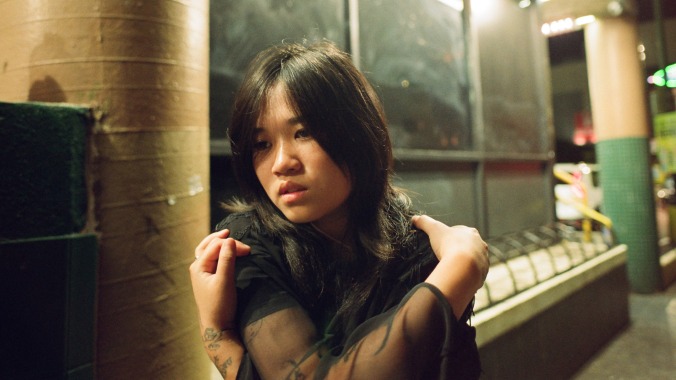Hana Vu Exits Her Comfort Zone
The Los Angeles singer-songwriter discusses exploring existentialism in music, keeping her vision insular, and working with Maegan Houang to create the visuals for her new album, Romanticism.
Photo by Andrew Yuyi Truong
Hana Vu feels like she has seen it all. Exhausted by being so old and so young simultaneously, the 24-year-old musician confesses “I don’t wanna go anywhere anymore / And I don’t wanna be anything” in “22.” Vu brought the intense drama and irrational imaginative world of her new album, Romanticism, to life by stepping outside of her comfort zone lyrically and creatively—including learning how to sing backward and allowing her head to be cast in a mold for her stirring “Care” music video.
“I went to this scary warehouse in Riverside where they put a bald cap on you and then plaster your face for like an hour. It’s really heavy—you can’t see, and it’s hard to hold your head up after a while because it’s so heavy,” she laughs. “Then, I had sessions with a linguist to study my mouth movements. I’d sing the song forward, and we worked with track-by-mouth movements. I would just watch this video backward and try to match it. It’s impossible to say something and sing something perfectly backward, but at least I could get lip-sync moments.”
Hana Vu’s music has always been emotional and vulnerable, but, for her second full-length album, she made sure it was uniquely hers for the first time. She holed up and wrote all of Romanticism without outside influence, a different approach from her previous albums where she collaborated with a team. It felt right, as she explored the feelings of a post-teenage yet pre-adulthood coming of age. “The only person who heard it was my co-producer, Jackson [Phillips],” Vu says. “I didn’t send it to anybody I knew. It was cool because nobody pressured me, and they trusted it would be ready when it was ready. It’s vulnerable to share your music and to be writing during any critiques. To assert my vision and myself, I wanted to keep it pretty insular to crystallize my experience—being in my early twenties, growing up and existing. I wanted to have a universally relatable story through my perspective and in my voice.”
Vu came of age as an adolescent in the Los Angeles DIY scene, releasing her debut EP How Many Times Have You Driven By at 17 in 2018. She played shows around the city, diving into the singer-songwriter scene, learning from her peers and expanding on her talents with each year of honing her craft. “Every time I make a new album, and I have more access to resources or skills that I didn’t have before, I always want to utilize it to its maximum,” she explains, pointing to her approach behind the ambitiously grand soundscape of Romanticism. “Every time I make an album, I want it to be as loud and aggressive as possible, sonically, because I feel like a pretty demure person, so it’s just fun to exercise. I was listening to a lot of the Killers and Coldplay—really big pop rock, the songs that you play on the radio in your car or you sing at karaoke at full volume. That’s what I was going for. We live all day long as people in our little inner worlds and feelings. So to be like, ‘I’m going to scream this and be loud.’ It’s very cathartic.”
-

-

-

-

-

-

-

-

-

-

-

-

-

-

-

-

-

-

-

-

-

-

-

-

-

-

-

-

-

-

-

-

-

-

-

-

-

-

-

-








































